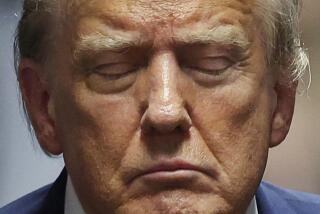‘Not Guilty’ Plea Is Entered for Hussein
- Share via
BAGHDAD — A characteristically defiant Saddam Hussein refused to enter a plea to formal charges of crimes against humanity Monday as the defense phase of his trial began, lashing out at the judge while insisting he was still Iraq’s leader.
“I can’t reduce my answer to ‘yes’ or ‘no,’ ” Hussein told Judge Raouf Rasheed Abdel Rahman, who demanded that the deposed president answer the charges of murder, forcible deportation, imprisonment and torture of villagers in the Shiite town of Dujayl after a 1982 assassination attempt against him.
“I cannot say ‘guilty’ or ‘not guilty,’ ” Hussein said. “You are in front of Saddam Hussein, the president of the republic.”
“You are a defendant,” Abdel Rahman replied.
“I am the president of the republic by the will of Iraqis,” Hussein said. “I do not recognize the agents who were brought here under banners and given titles and became political officials.”
Abdel Rahman entered a “not guilty” plea on Hussein’s behalf, after reciting a long list of formal charges based on testimony and evidence presented thus far in the 7-month-old trial. Testimony then shifted to the defense of a minor defendant.
Court officials have said the defense plans to call 60 witnesses, with the trial set to resume today.
Meanwhile, violence continued outside the courtroom, and negotiators failed to reach an agreement on a new government.
The U.S. military Monday announced the deaths of two soldiers after their helicopter was apparently shot down Sunday in Yousifiya, about 10 miles south of Baghdad, where fighting this weekend killed 41 suspected Sunni Arab insurgents.
Also killed Sunday were two Marines in Al Anbar province, west of Baghdad, bringing to 47 the number of U.S. and coalition military personnel killed this month.
American officials said two women and two children suffered shrapnel wounds in the fighting in Yousifiya and nearby Latifiya, but the Iraqi Islamic Party, the country’s main Sunni Arab political group, disputed the American account, saying U.S. forces destroyed a residential building, killed seven “family members,” injured women and children and arrested two women and three children. The statement demanded their release.
There was no immediate response from U.S. officials.
Police said Monday that they discovered the bodies of at least 17 men killed in apparent sectarian violence in and around the capital. Gunmen killed officials of the electricity and housing ministries, and at least two roadside bombs in Mosul and Baghdad killed an Iraqi and injured seven.
Western officials and Iraqi leaders are banking on a new government to help stem the violence. Prime Minister-designate Nouri Maliki has until May 22 to form a Cabinet that meets parliament’s approval but has yet to determine who will lead the ministries of Interior and Defense.
Negotiations continued Monday, with some officials saying that the government would be announced by Wednesday and others sharply disagreeing. Despite claims that control of all but the most important government agencies had been settled, politicians said much was unresolved, with Shiites and Sunnis fighting over ministries such as Health.
“Our Shiite brethren have promised us yesterday the Ministry of Health, but as usual, the talk of night vanished by the light of the day,” said Ammar Wajih, a Sunni negotiator. “The Sunnis insist on the Ministry of Health.”
Times staff writers James Rainey, Saif Hameed, Saif Rasheed and Shamil Aziz in Baghdad and a special correspondent in Mosul contributed to this report.
More to Read
Sign up for Essential California
The most important California stories and recommendations in your inbox every morning.
You may occasionally receive promotional content from the Los Angeles Times.










